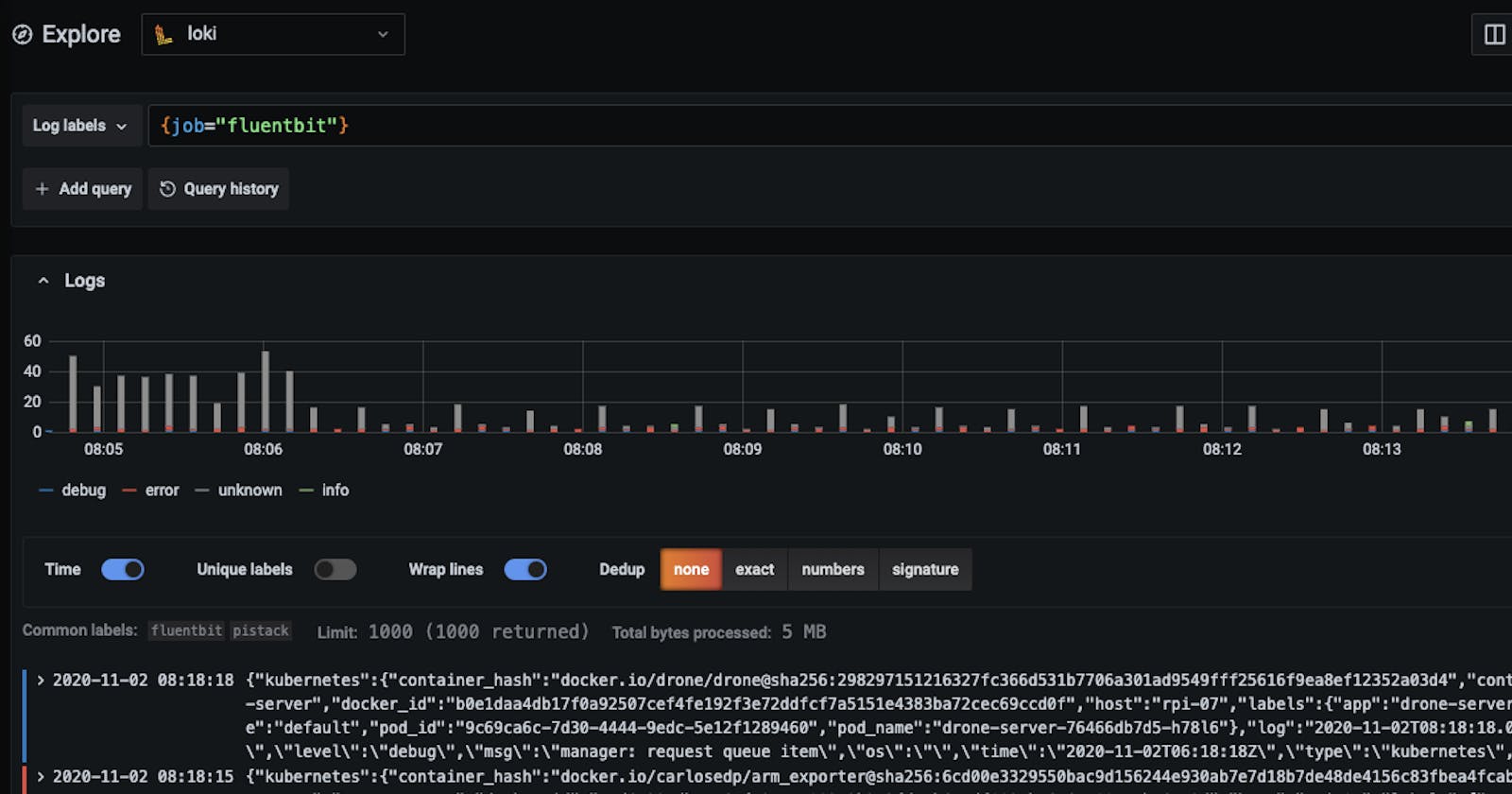In this example, I will log to Loki using Fluent-Bit on k3s distribution of Kubernetes on my Raspberry Pi Cluster.
I am referencing the documentation from fluent-bit to get the sources.
I have a Loki instance running on 192.168.0.20 which is listening on port 3100 and will be assigning it to the FLUENT_LOKI_URL environment variable.
Create the namespace:
$ kubectl create namespace logging
Create the service account and role:
$ kubectl create -f https://raw.githubusercontent.com/fluent/fluent-bit-kubernetes-logging/master/fluent-bit-service-account.yaml
$ kubectl create -f https://raw.githubusercontent.com/fluent/fluent-bit-kubernetes-logging/master/fluent-bit-role.yaml
$ kubectl create -f https://raw.githubusercontent.com/fluent/fluent-bit-kubernetes-logging/master/fluent-bit-role-binding.yaml
Fluent-bit will be setup as a Daemon set so it will run on every node, and the config will be stored as a config map.
The original config will be available at fluent-bit-configmap.yaml but since we are not logging to Elasticsearch, but to Loki, we will edit the config:
$ wget https://raw.githubusercontent.com/fluent/fluent-bit-kubernetes-logging/master/output/elasticsearch/fluent-bit-configmap.yaml
And then add the loki output config:
output-loki.conf: |
[OUTPUT]
Name loki
Match *
Url ${FLUENT_LOKI_URL}
BatchWait 1s
BatchSize 30720
Labels {job="fluentbit", stack="pistack"}
AutoKubernetesLabels true
and also adjust the config to include the file that we are introducing:
...
@INCLUDE output-loki.conf
...
So my complete config map will look like this:
apiVersion: v1
kind: ConfigMap
metadata:
name: fluent-bit-config
namespace: logging
labels:
k8s-app: fluent-bit
data:
# Configuration files: server, input, filters and output
# ======================================================
fluent-bit.conf: |
[SERVICE]
Flush 1
Log_Level info
Daemon off
Parsers_File parsers.conf
HTTP_Server On
HTTP_Listen 0.0.0.0
HTTP_Port 2020
@INCLUDE input-kubernetes.conf
@INCLUDE filter-kubernetes.conf
@INCLUDE output-loki.conf
input-kubernetes.conf: |
[INPUT]
Name tail
Tag kube.*
Path /var/log/containers/*.log
Parser docker
DB /var/log/flb_kube.db
Mem_Buf_Limit 5MB
Skip_Long_Lines On
Refresh_Interval 10
filter-kubernetes.conf: |
[FILTER]
Name kubernetes
Match kube.*
Kube_URL https://kubernetes.default.svc:443
Kube_CA_File /var/run/secrets/kubernetes.io/serviceaccount/ca.crt
Kube_Token_File /var/run/secrets/kubernetes.io/serviceaccount/token
Kube_Tag_Prefix kube.var.log.containers.
Merge_Log On
Merge_Log_Key log_processed
K8S-Logging.Parser On
K8S-Logging.Exclude Off
output-elasticsearch.conf: |
[OUTPUT]
Name es
Match *
Host ${FLUENT_ELASTICSEARCH_HOST}
Port ${FLUENT_ELASTICSEARCH_PORT}
Index fluent-pistack-k3s
Logstash_Format On
Replace_Dots On
Retry_Limit False
HTTP_User user
HTTP_Passwd pass
tls On
output-stdout.conf: |
[OUTPUT]
Name stdout
Match *
output-loki.conf: |
[OUTPUT]
Name loki
Match *
Url ${FLUENT_LOKI_URL}
BatchWait 1s
BatchSize 30720
Labels {job="fluentbit", stack="pistack"}
AutoKubernetesLabels true
parsers.conf: |
[PARSER]
Name apache
Format regex
Regex ^(?<host>[^ ]*) [^ ]* (?<user>[^ ]*) \[(?<time>[^\]]*)\] "(?<method>\S+)(?: +(?<path>[^\"]*?)(?: +\S*)?)?" (?<code>[^ ]*) (?<size>[^ ]*)(?: "(?<referer>[^\"]*)" "(?<agent>[^\"]*)")?$
Time_Key time
Time_Format %d/%b/%Y:%H:%M:%S %z
[PARSER]
Name apache2
Format regex
Regex ^(?<host>[^ ]*) [^ ]* (?<user>[^ ]*) \[(?<time>[^\]]*)\] "(?<method>\S+)(?: +(?<path>[^ ]*) +\S*)?" (?<code>[^ ]*) (?<size>[^ ]*)(?: "(?<referer>[^\"]*)" "(?<agent>[^\"]*)")?$
Time_Key time
Time_Format %d/%b/%Y:%H:%M:%S %z
[PARSER]
Name apache_error
Format regex
Regex ^\[[^ ]* (?<time>[^\]]*)\] \[(?<level>[^\]]*)\](?: \[pid (?<pid>[^\]]*)\])?( \[client (?<client>[^\]]*)\])? (?<message>.*)$
[PARSER]
Name nginx
Format regex
Regex ^(?<remote>[^ ]*) (?<host>[^ ]*) (?<user>[^ ]*) \[(?<time>[^\]]*)\] "(?<method>\S+)(?: +(?<path>[^\"]*?)(?: +\S*)?)?" (?<code>[^ ]*) (?<size>[^ ]*)(?: "(?<referer>[^\"]*)" "(?<agent>[^\"]*)")?$
Time_Key time
Time_Format %d/%b/%Y:%H:%M:%S %z
[PARSER]
Name json
Format json
Time_Key time
Time_Format %d/%b/%Y:%H:%M:%S %z
[PARSER]
Name docker
Format json
Time_Key time
Time_Format %Y-%m-%dT%H:%M:%S.%L
Time_Keep On
[PARSER]
Name syslog
Format regex
Regex ^\<(?<pri>[0-9]+)\>(?<time>[^ ]* {1,2}[^ ]* [^ ]*) (?<host>[^ ]*) (?<ident>[a-zA-Z0-9_\/\.\-]*)(?:\[(?<pid>[0-9]+)\])?(?:[^\:]*\:)? *(?<message>.*)$
Time_Key time
Time_Format %b %d %H:%M:%S
Create the config map:
$ kubectl apply -f fluent-bit-configmap.yaml
The Daemon set deployment manifest was retrieved from fluent-bit-ds.yaml, but the image used is not based for ARM, so in this post I demonstrated how to build images for ARM.
I have included that image in the manifest below and also informed the environment section about my loki url in FLUENT_LOKI_URL:
$ cat
apiVersion: apps/v1
kind: DaemonSet
metadata:
name: fluent-bit
namespace: logging
labels:
k8s-app: fluent-bit-logging
version: v1
kubernetes.io/cluster-service: "true"
spec:
selector:
matchLabels:
k8s-app: fluent-bit-logging
template:
metadata:
labels:
k8s-app: fluent-bit-logging
version: v1
kubernetes.io/cluster-service: "true"
annotations:
prometheus.io/scrape: "true"
prometheus.io/port: "2020"
prometheus.io/path: /api/v1/metrics/prometheus
spec:
containers:
- name: fluent-bit
image: pistacks/fluent-bit-plugin-loki:armv7-latest
#image: fluent/fluent-bit:arm32v7-1.6.1
imagePullPolicy: Always
ports:
- containerPort: 2020
env:
- name: FLUENT_LOKI_URL
value: "http://192.168.0.20:3100/loki/api/v1/push"
volumeMounts:
- name: varlog
mountPath: /var/log
- name: varlibdockercontainers
mountPath: /var/lib/docker/containers
readOnly: true
- name: fluent-bit-config
mountPath: /fluent-bit/etc/
terminationGracePeriodSeconds: 10
volumes:
- name: varlog
hostPath:
path: /var/log
- name: varlibdockercontainers
hostPath:
path: /var/lib/docker/containers
- name: fluent-bit-config
configMap:
name: fluent-bit-config
serviceAccountName: fluent-bit
tolerations:
- key: node-role.kubernetes.io/master
operator: Exists
effect: NoSchedule
- operator: "Exists"
effect: "NoExecute"
- operator: "Exists"
effect: "NoSchedule"
Go ahead and create the deployment:
$ kubectl apply -f fluent-bit-ds.yaml
Once all the pods has checked in, we can verify:
$ kubectl get pods -n logging -o wide
NAME READY STATUS RESTARTS AGE IP NODE NOMINATED NODE READINESS GATES
fluent-bit-sg62c 1/1 Running 0 8h 10.42.4.24 rpi-03 <none> <none>
fluent-bit-s4gx4 1/1 Running 0 8h 10.42.2.92 rpi-06 <none> <none>
fluent-bit-8p76b 1/1 Running 0 8h 10.42.1.82 rpi-07 <none> <none>
fluent-bit-fnvmd 1/1 Running 0 8h 10.42.3.23 rpi-02 <none> <none>
fluent-bit-zsp82 1/1 Running 0 8h 10.42.0.77 rpi-05 <none> <none>
fluent-bit-89xl5 1/1 Running 0 8h 10.42.5.23 rpi-01 <none> <none>
Head over to Grafana and check if we can see logs under the job fluentbit:

Let's test it out by running a pod that just pings:
$ kubectl run --rm -it --restart=Never debug --image=busybox -- ping 8.8.8.8
Now let's look for logs with the following labels:
{job="fluentbit", container_name="debug"}

Resources:
